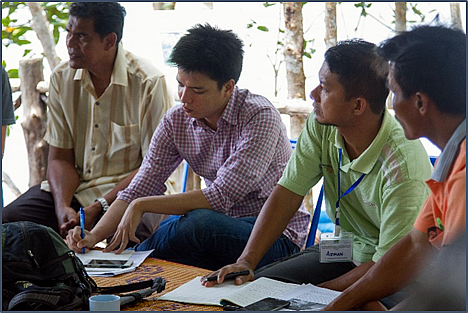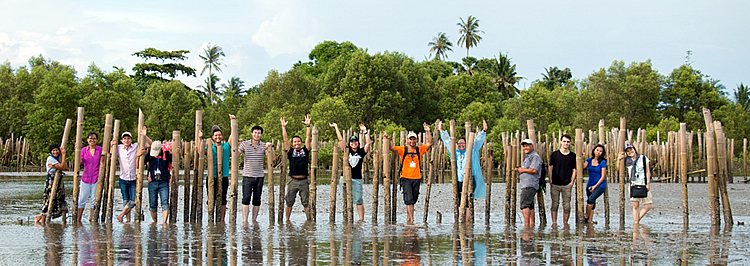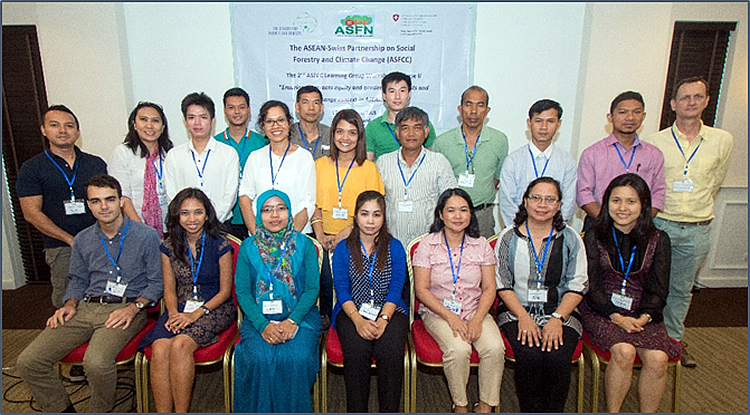With the theme, “Ensuring grassroots equity and gender in the forests and climate change context in ASEAN countries”, the LG workshop was attended by the focal persons of the implementing partners, namely: the Center for International Forestry Research (CIFOR), the Non-Timber Forest Product-Exchange Programme (NTFP-EP) South and Southeast Asia, and Southeast Asian Regional Center for Graduate Study and Research in Agriculture (SEARCA) represented by Ms. Rosario B. Bantayan, Program Specialist, Knowledge Management Department. Representatives from the ASEAN Social Forestry Network (ASFN) Secretariat and ASEAN Member States (AMS) such as Cambodia, Indonesia, Lao PDR, Malaysia, Myanmar, Philippines, Thailand and Vietnam consisting of researchers, community forestry practitioners, development management officers, and officers of forestry departments and institutions also took part in the sharing and learning event which has become the flagship activity of the ASFCC and the ASFN.
As an implementing partner in Phase II of the ASFCC, SEARCA implements the ASFN Flexible Funding Mechanism through the ASFN Strategic Response Fund (ASFN-SRF), which supports in-country initiatives that will enable the AMS focal points to quickly respond to emerging issues and challenges on food security, poverty, and climate change and increase their ability to articulate policy recommendations and directions.
The four-day ASFCC LG workshop, organized by RECOFTC and funded by ASFN Project aimed to: 1) provide a sharing and learning platform for government officials from ASEAN countries and ASFCC organization partner representatives on the importance of ensuring grassroots equity in the forests and climate change context; 2) stimulate critical thinking on how to address issues of grassroots equity in the context of forest-related engagement processes; and 3) observe real case experience on how social equity is applied on the ground and relate to classroom discussions. The LG is envisioned to provide a platform for sharing and learning in the area of social forestry and climate change. Thus, the participants took turns in engaging in “fishbowl” discussions as they responded to questions related to ensuring grassroots equity in forests and climate change context, as follows: 1) How do you see the importance of social equity and gender in sustainable forest management (SFM)?; 2) Are there any existing initiatives or mechanism in your country to ensure grassroots equity and gender inclusion in forest sector?; and 3) On the basis of key equity elements in SFM, which present biggest challenges in implementation in your country context and why?.
 One of the highlights of the LG workshop was the field visit to mangrove forest restoration projects in Baan Khlong Yang, Koh Lanta District and Baan Khlong Prasong, Krabi Province. The field visits allowed the participants to learn more about the role of local communities especially women, non-government organizations (NGOs), government agencies and local authorities in mangrove forest conservation and management. The interview and discussion with the representatives of the village committees and local authorities gave the participants some insights into the challenges and dynamics of a multi-stakeholder decision-making process to enhance equity in climate change adaptation practice.
One of the highlights of the LG workshop was the field visit to mangrove forest restoration projects in Baan Khlong Yang, Koh Lanta District and Baan Khlong Prasong, Krabi Province. The field visits allowed the participants to learn more about the role of local communities especially women, non-government organizations (NGOs), government agencies and local authorities in mangrove forest conservation and management. The interview and discussion with the representatives of the village committees and local authorities gave the participants some insights into the challenges and dynamics of a multi-stakeholder decision-making process to enhance equity in climate change adaptation practice.
The 1st ASFCC LG Workshop was held on 13-14 October 2014, in Nan Province, Thailand with the theme “Community forestry as a strategy for adapting to climate change” with Ms. Mary Ann A. Batas, Project Associate, Program Management Office, ASEAN Social Forestry Network Strategic Response Fund (ASRF) - SEARCA as participant.
The 2nd ASFCC LG workshop concluded with the commitment of the participants to promote social equity and mainstream gender in their respective work context.

